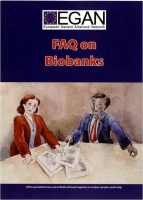FAQ on Biobanks (various languages)
 To help promote understanding and to secure informed involvement with the activities of biobanks and the research they make possible, EGAN assembled a list of questions that have been frequently asked of us by those contemplating volunteering to be part of this large scale research activity.
To help promote understanding and to secure informed involvement with the activities of biobanks and the research they make possible, EGAN assembled a list of questions that have been frequently asked of us by those contemplating volunteering to be part of this large scale research activity.
Developments in genomics and in bio-informatics have made it possible to analyse quantities of data and samples that, even a few short years ago, would have been unimaginable. This has created the possibility of examining the complex interplay that operates between genes, and between genetic, environmental and lifestyle factors in the search to understand common complex diseases (heart disease, diabetes, cancer and mental health disorders, to name but a few) and to develop targeted therapies to treat and possibly even cure them.
Generating the data necessary to undertake this research has led to the establishment of “biobanks” in the public and the private sector around the world. The largest of these may contain tissue samples and data from half a million or more people. Patients, families and members of the general public are increasingly likely to be asked to volunteer to contribute to a biobank to help medical research.
In this fast changing field it is important that those asked to contribute their tissue and to volunteer potentially sensitive personal information have the opportunity to be clear about what is being asked of them. To help promote understanding and to secure informed involvement with the activities of biobanks and the research they make possible we have assembled a list of questions that have been frequently asked of us by those contemplating volunteering to be part of this large scale research activity. The answers and the current
booklet are a result of a collaboration between EGAN and Roche. We hope the information given contributes to clarify the aims and purposes of biobanks, so as to help promote informed engagement by patient and from healthy citizens.
